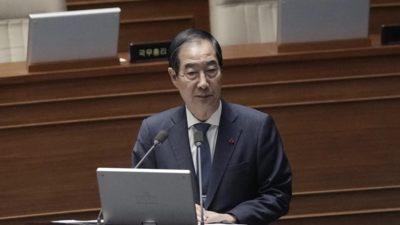
South Korea political turmoil escalted on Saturday as lawmakers voted to impeach President Yoon Suk Yeol following his controversial declaration of emergency martial law earlier this month, accusing parliament of undermining the government and aligning with North Korea. With Yoon suspended from office, Prime Minister Han Duck-soo, a veteran technocrat with decades of experience across conservative and liberal administrations, has been appointed acting president, tasked with steering the nation through a period of unprecedented turmoil.
Who is Han Duck-soo?
Han Duck-soo, South Korea’s current prime minister and now acting president, is a seasoned technocrat with a career spanning over three decades under five different administrations, both conservative and liberal. His expertise in economics, trade, and diplomacy, coupled with his reputation for rationality and nonpartisan approach, has made him a trusted figure in South Korean politics.
Career highlights
Han, 75, has held numerous leadership roles, including ambassador to the United States, finance minister, trade minister, and head of several think tanks. His career highlights include serving as South Korea’s ambassador to the OECD and holding a Harvard doctorate in economics.
Known for his moderate demeanor and hard work, he has consistently been tapped for critical positions, earning praise for his ability to navigate complex policy issues.
Prime minister and acting president
Han first served as prime minister in 2007-2008 under President Roh Moo-hyun. He returned to the role in 2022 when appointed by President Yoon Suk Yeol, who lauded Han’s ability to manage national affairs irrespective of political factions. Following Yoon’s impeachment over his controversial attempt to impose martial law, Han assumed the role of acting president, as mandated by South Korea’s constitution.
A balancing act
South Korea’s constitution does not clearly define the extent of the prime minister’s authority in an acting president’s role. Scholars are divided on whether Han’s powers should be limited to maintaining government functions or extend to full presidential authority.
Challenges ahead
Han’s role as acting president could last months while the Constitutional Court reviews the impeachment case against Yoon. If Yoon is permanently removed, Han will lead the country until a new president is elected. Should Han himself face impeachment, the finance minister would be next in line to take over as acting president.
As acting president, Han faces the daunting task of steering the nation through its gravest political crisis in four decades. His immediate priorities include maintaining governmental stability, addressing economic challenges, and managing threats from nuclear-armed North Korea. However, Han’s tenure could be complicated by ongoing investigations into his role in the martial law decision. The opposition Democratic Party has already filed a complaint seeking his inclusion in the probe.
Diplomatic experience
Han’s diplomatic experience includes overseeing the negotiation of the US-South Korea Free Trade Agreement and serving as South Korea’s ambassador to the United States from 2009 to 2011. During this time, he worked closely with the US Congress to secure the agreement’s ratification.
Fluent in English, Han also has ties to current US President Joe Biden, who was vice president during Han’s ambassadorship.






